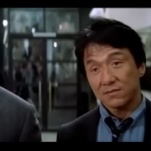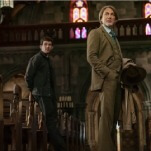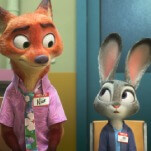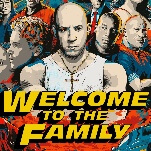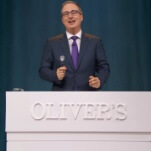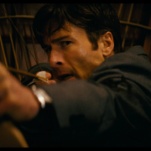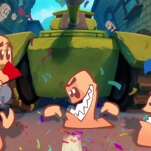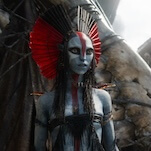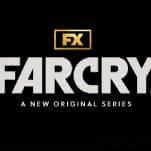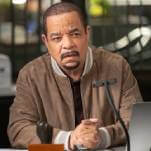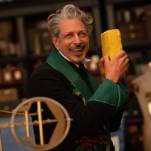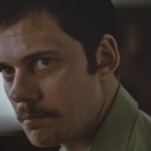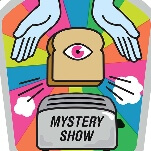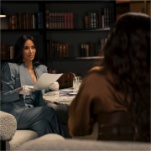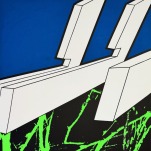James Frain on playing Spock’s dad and wearing the biggest fangs on True Blood
Image: Graphic: Natalie Peeples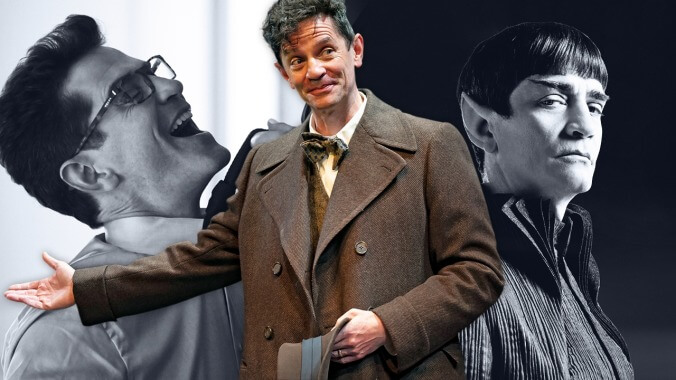

The actor: Few actors have the range of James Frain. Born in Leeds, England, he has a strong Shakespearean stage background, and has performed with The Royal Shakespeare Company, Almeida, and Royal Court in the U.K. But his first big break in the U.S. came in 2000 with the Natalie Portman romantic drama Where The Heart Is, about a girl who gives birth in a Walmart, although Frain also kept up with his period costume dramas in movies like The Count Of Monte Cristo and Elizabeth and series like The Tudors and The White Queen. But in the States, Frain may be most famous for his pivotal roles in genre series like True Blood, Orphan Black, and Star Trek: Discovery. He even has an unrecognizable spot in the movie sequel Tron: Legacy.
Frain was more recognizable recently at the Chicago Shakespeare Theater, returning to his stage roots as speech therapist Lionel Logue in a production of The King’s Speech. As the role kept Frain in Chicago for a while, we managed to grab him between shows to sit down and talk about the various high- and lowlights of his wildly diverse career.
The A.V. Club: Can we go way back to the Walmart-baby movie? Your accent was spectacular in that.
James Frain: Thanks. That was 2000. I just had been coming and going between L.A. and London, and in that year, I went to shoot for a couple of movies, and one of them was Reindeer Games with Ben Affleck. It was by John Frankenheimer.
AVC: There are a lot of twists in that movie. The brother-sister one is weird.
JF: It’s basically twists. It’s a lot of twists. It was supposed to be kind of Tarantino-esque, kind of high-comedy. So that happened, and then while I was doing that, I auditioned for Where The Heart Is, and auditioned with Natalie. She was more of a professional than I was at that time. Just extremely accomplished and confident and led the set.
AVC: Had you been to that part of the U.S. before that?
JF: We filmed it in Texas. I hadn’t. I was eating it all up. I’ve always loved America from the first time I came here, and I knew I was going to end up here. And I’ve been here for 17 years. I met my wife about three months after relocating, and it was kind of a done deal. Now we’ve got kids and the whole thing.
The Walmart-baby movie, Where The Heart Is, didn’t do very well in its time. Although, if it got those numbers now, it’d be a smash hit. But in its era, just at the end of that transition into where we are now, it was—I think it got to no. 4 in the box office, which was not considered sufficiently successful. Now you’d just be over the moon.
AVC: It doesn’t have any superheroes in it. It’s not a sequel.
JF: No, it’s an actual movie. But also, what’s fascinating is, it’s one of the things I’ve done in my career where people most recognize me from. Little girls have grown up with it. So I meet a lot of people in their 20s and 30s who are like, “I’ve been watching you since I was 5 years old!” It’s a family movie, and it was forever on cable. I wonder sometimes, because we always hear that, but I wonder if executives and studio people know really how much the life of a story or of a movie actually exists in the imagination of the audience. There are things that they take to their heart that people forget about. We hear about it because we get that kind of feedback all the time. That, and then I did Count Of Monte Cristo, which was another one where a lot of people go, “Oh my god, it’s my favorite movie.” So we hear from the audience which movies last, but I don’t think those guys do. You know? Because for them, they’re onto the next thing.
AVC: Your career is so interesting. That’s a perfect example. You do that, and you do Count Of Monte Cristo, and you do all these period pieces, and you’re on the Shakespeare stage. You have tremendous range. Is there a particular genre that you like? Do you lean toward Elizabethan?
JF: It all kind of leans toward me. These things also come in cycles. So I was in Elizabeth, and then in The Tudors, which were both written by the same guy. When Elizabeth was happening, we didn’t know it was going to be successful. It was a hit-or-miss thing. Obviously Cate Blanchett, ka-boom, right? And then The Tudors, similarly, that was like, “Who’s going to watch this series about Henry VIII?” And that just took off, too. So people just kind of take things to their heart. And then it opens other doors for writers in that field. There are people, like Philippa Gregory’s novels getting adapted, and that stuff all comes up.
But also if you grow up in England, you’re going to be doing kings. It’s a thing. Either the king or the guys holding the king’s coat. I’m so good at holding the king’s coat in the show [The King’s Speech]. I take his coat off so many times. I was showing the understudy, he wanted to know what all my movements were. So I went through the script with him, and he’s like, “How many times do you take his coat off?” I’m like, I’ve never really thought about it, but it does seem to be quite a lot. Quite a theme.
AVC: Your guillotine scene as Thomas Cromwell in The Tudors is spectacular.
JF: It was a true story. People are obsessed with it. The research on that kind of stuff is so much fun. I found out when I was researching that that period of history is the most-written-about period of English history. The full story is never fully known, you know? We have a certain amount of anecdotal evidence, we have certain amount of written evidence, but it was also a period of massive change. It was the first era of globalization when England became an actual nation. Before that, it was just sort of feudal empires.
AVC: Do you have a favorite royal? Somebody that you haven’t played yet that you’d like to?
JF: Oh, I don’t know. I think I’ve played more Cromwells than royals, funnily enough. Do I have a favorite royal? [Laughs.] My favorite royal has got to be Richard III. The original House Of Cards, right?
JF: Oh really now, you’re trolling now. That was so much fun. We actually shot that in Loch Ness and around that area. So we were in the wilds, and Scotland is absolutely beautiful. And we did this one scene, and it was me and Ted Danson in Loch Ness. It was cold—we had wetsuits on, but we were cold—and we were swimming around like this and they were shooting this little outside shot.
AVC: In the loch itself?
JF: Yeah! I looked at him and he looked at me, and I was like, “I have never believed in the monster until this moment.” And he’s like, “I’m kind of thinking about that myself. This would be an interesting time to find out it was real. When it comes to eat you.” But it didn’t come to eat us. We lived to fight another day.
AVC: No sightings?
JF: No sightings.
AVC: Were enough people over there into it where you were like, “Maybe…?”
JF: I think its moment is passed.
AVC: That’s disappointing.
JF: Same with Bigfoot. Bring ’em all back.
AVC: In Hilary and Jackie, a biopic about British classical-musician sisters, you play Daniel, the famous conductor who Jackie du Pré eventually marries.
JF: Daniel Barenboim, who is still a force in world orchestra and music. He’s an extraordinary man. He’s a really interesting guy, and he does a lot of work in Israel with bringing Palestine and Israeli kids together and forming orchestras and building bridges through art. He’s an inspiring character for sure.
AVC: Was the conducting part difficult?
JF: You know what? I actually had to conduct an orchestra for a sequence. I had to learn how to play these piano pieces, and I had to learn how to conduct a whole section from a symphony, which we shot. They brought in, I think it was the Liverpool Philharmonic Orchestra, and musicians are no joke. They’re hardcore. They’re way, way harsher than actors. If you’re no good, they’ll let you know. So I just got up there, and I learned my moves, but I conducted this whole piece, and they only used pieces of it in the end, but I got to the end of it and I was like that was worth doing. But I don’t know what the musicians really thought. They were very kind.
AVC: Well, as you were saying, they would have told you. And it must have been so difficult.
JF: Keeping in time and making it look fluid. That was all the fun of that. We had so much research and so much help.
But here, since I’ve been in the States, it’s been a lot more stuff like True Blood and Star Trek and Gotham and the whole kind of sci-fi arena I’ve been doing a lot more of recently.
AVC: That makes sense. The work’s in L.A. 24 was really your first series, right?
JF: Yeah, first American series, it was.
AVC: Was that a really intense set? The stakes were so high.
JF: It was very well-run. By the time I had come into it, it was an efficient machine. They knew exactly what worked, and they knew exactly what the look was. They had a very tight schedule. It helped with that sense of compressed urgency in the story, for sure.
AVC: Doesn’t Jack Bauer tase you? He’s torturing you to get some information out of you in a chair.
JF: He electrocutes me. And then he kills me. In the scene with the Chinese terrorist, he’s like, “I’m pulling the plug on [Paul], I’m saving him.” And I was like, “Dude, I took a bullet for you, man.”
AVC: For the torture scene, did you practice screaming, or how does the choreography go for something like that?
JF: We didn’t especially choreograph that. I was like, “I guess this is probably how you would react to electric shock, from what I’ve read. Try not to overdo it.” It looks convincing. It feels silly at the time. They have stunt people, safety is very clear around that. On any set that you’re on, there’s always stunts, there’s always safety regulations that I have to follow.
JF: Empire was shot in Rome. We were shooting at the same time that HBO was doing Rome. We were the ABC version—ABC was doing a series based on Gladiator. That’s what Empire was, it was almost the same period of history. I found out afterwards there were all these fights between costume departments, because there’s only a certain number of Roman helmets and uniforms available. They’ve got a lot, but not enough to do these two big shows. But HBO’s Rome was the one that kind of shot out of the gate.
[Empire] was actually Emily Blunt’s first job. She had just done the movie that broke her out, but it hadn’t come out yet. And then she got the lead girl in Empire. So I worked with her on that, and I was like, “She’s going to be a star.”
AVC: I think if there’s a commonality to the characters you’ve played, it’s intensity. Like Franklin on True Blood.
JF: I loved Franklin. His redeeming feature was his sense of humor, but what was hilarious and chilling about him at the same time was that he didn’t know that he was crazy. Like all really true crazy people. He really thought that he was in love with Tara, and this was a romance that was happening. And he was kidnapping her and tying her up. She just wasn’t in on the joke. It was really well-written, a really well-written character.
AVC: You must have been really close with Rutina Wesley, who played Tara. There’s a lot of trust going on there with all the biting and the blood and whatnot.
JF: Yes, she was great. And she was the series regular, and I was coming in on the third season. She made sure that I was comfortable. She was like, “Look, we’re here at work, it’s all good.” She’s a total pro. She’s on Queen Sugar now.
The funniest thing about Franklin is that I found out I had the longest teeth of any of the characters. They were long. So that was a little career highlight as well. You get fitted for the teeth, and they make them look super real. You don’t use them that much, you only use them when you do biting and stuff like that. But that was really fun. I had big-ass teeth.
JF: That costume is amazing. They shaved my head, and they bleached my eyebrows. So I came back from shooting that, and I was at a party and there was a friend of a friend of ours who was a therapist and he kind of took my wife over and says, “Is everything okay with James?” She’s like, “No, it’s for a role.” Because I looked fairly alarming. I forgot how alarming I looked. I’d go to the gym and be like, “Everyone’s staring at me. I don’t know why.” Bald with bleached eyebrows.
It was a long shoot. It was, like, five months.
AVC: Was it all green screen and special effects?
JF: Yeah, it was huge.
AVC: Was that stressful, playing against things that aren’t there?
JF: The first time I did a green-screen thing I was like, “Oh, this is like theater, you just have to make it all up.”
AVC: You’re good at that. Were you a fan of the original Tron?
JF: Yeah, and Jeff Bridges, of course. So that was a career high. And [Frain’s character] also had a little bit of comic flavor to him. The inept henchman. It was a lot of fun. But those costumes… Oh, it was so uncomfortable. They look amazing, but they were so tight, and so kind of welded-on. It took, like, five people to pull you into it, and then it was strapped on you for the day. So you had to time your eating, and you couldn’t sit down properly. They made seats for us out of bicycle seats that we could lean against during the day. That was the challenge on that show.
All of the light strips on the costume were individual light strips with their own batteries, because they would flash out, and then you didn’t have to replace the whole costume. They’d come in and rip that one off and put a new one on, and for much of the shoot, it was really exciting if you could get through a take with your whole suit staying lit all the way through. “Yes, we got one! We got one!” Because the things were always going out in the middle of the take. Stuff you don’t think about, you know? Brilliant design though.
AVC: The Cape was a superhero series that NBC was really pushing that year, and you played the villain. And then it got pulled after 10 episodes.
JF: The Cape was trying to invent a whole new universe of superheroes at a time where there was a lot of competition from universes of known superheroes. So it was ambitious, and it was kind of just finding its feet and finding its audience, but not in time. And then the role I played in Gotham was similar to that. In season three.
AVC: Similar to the Chess character?
JF: Kind of. It was also a fictionalized character, who was also the bad guy. But that was very much in a known universe, and very imaginatively done.
I remember we did a whole love-triangle story that ended up getting cut, which involved the Barbara character and the character who was my half sister in the show. And then I think they showed it all and were like, “Eh, I don’t know, it just feels a little too close to the edge here for mainstream entertainment.”
AVC: Because you were going to have an affair with your half sister?
JF: Yeah. There was a sort of love triangle that we shot there. It was deliberately creepy and strange, because that was the world they were creating. So that was fun to shoot, but afterwards when we saw the cut version, I was like, “Oh, I guess that’s a little over the line.”
JF: [On True Detective], I was doing cop stuff. I think that was my first cop. I got to wear a cop uniform right at the end. I got to be a cop, and a cowboy, and a vampire. I’ve got my list. There’s a few left on the list.
I was sort of a cowboy in The Lone Ranger, but it was such a small role. We got trained, taught how to ride and gunsling and all that kind of stuff. And it ended up being so much story, that a lot of our story was kind of leaned down. But that was fun. I want to be a cowboy again.
AVC: You must have already known how to ride?
JF: Well, Western riding is different from English riding. I was like, “Why are we doing so much riding? We’re doing so many riding lessons.” I mean, it’s great. It must be really expensive. I really appreciate it. I can ride Western now.
My first day of filming, we were in a valley, and we walked up to the edge of this cliff, and we had to walk our horses down because there was no road. It was a dirt path, it was on rocks. It was for real. And then we got to this ledge, and all our horses are there. It’s the four or five actors, and there are about three or four stunt. So okay, here’s the shot: You guys are going to gallop full pace right to the edge of this sheer-drop cliff, and then right at the cliff, you’re going to pull your horse up short, and the camera is going to come up from the valley as you guys are riding in, and it’s going to end up on a close-up of you. I was like, “What! What? What did you just say? Is this really happening?” They’re like, “Oh, yes.” I was like, “I now understand why we had all those lessons,” because that shit was terrifying. It was absolutely terrifying.
The interesting thing was, the creatures who were most aware of how terrifying and insane it was were the horses, because they stopped way before the ledge. They were like, “Oh no. No.” So then we had to urge our horses to get them into the shot. But, you know, that’s why you do this. Days like that.
AVC: Unfortunately, The Lone Ranger wasn’t really well-received. Similar to True Detective season two.
JF: I thought [True Detective season two] was great. I was super proud of it. It’s a lot of stories. Actually, both of those shows, part of what was difficult to make work was the amount of story. The Lone Ranger had a lot of story elements, and True Detective had a lot of story elements. And that’s a hard thing to bring on. With the best people doing their best work, it’s [still] a very hard thing to do.
JF: I got Orphan Black because I was doing another show, a BBC America show, and they gave us a gift on the first day of some of their other shows, and Orphan Black had just started, and I hadn’t heard of it. Season one was part of this little gift package. So I came back from the first day of rehearsals, and I put Orphan Black in and watched it all the way through. I was like, “I’ve got to get on this show. I’ve got to work with Tatiana [Maslany]. She is amazing.” And I wouldn’t stop talking about it. It got back to the guys at BBC America, who got ahold of me and said, “Hey, we hear you want to do Orphan Black. We’d love to have you.” I was like, “Really? This really happens like this?” That’s never happened before, or even since. But it did happen then. So that was a really cool thing. She is amazing.
AVC: How did she switch into the different clones while performing?
JF: I don’t know how she does it. She’s just that talented. We’d do a scene, it’d be you and me, and Tatiana’s clone, Tatiana’s clone, Tatiana. We’d shoot the scene once with her, and then with stands with tennis balls on them, which we would have to pretend were different Tatianas. And then she’d go and get changed, and then this tennis ball would go here, and now she’s sitting here, and we’d shoot the scene again, and then the tennis ball goes here, and then she’s changing… it was every day like this. Incredible. I said, “You’re getting an Emmy for this. Trust me.”
AVC: How much of a Star Trek fan were you before getting to play Spock’s dad?
JF: I grew up with it. And in England, it was on Saturday mornings. That’s when we would get our American TV. I didn’t like Star Wars.
AVC: So you knew the whole canon and the other Star Trek shows as well?
JF: Well, it turns out there’s, like, millions of hours of Star Trek shows. There’s a lot of Star Trek shows. I know this because they had what they called “The Canon”—they had, like, a bible on set. Because we were doing a prequel, all our story lines had to feed into existing canon. So if you hadn’t seen all of it, by the time that you shot a season you pretty much knew all the story lines. We were constantly talking about what would work and what wouldn’t work.
But the donning of the ears, and the eyebrows, and everything—that was quite a moment.
AVC: Did you tear up?
JF: I think I fell asleep because it took so long. I looked in the mirror and was like, “I kind of look like an elf.” They were like, “Don’t worry about that. You’ll get used to that.”
And then they gave me the haircut. When they did that haircut in the early ’60s on Spock, that would have been the hippest haircut. That was the Beatle cut. Now it’s the Vulcan cut. But I looked in the mirror, and I was like, “This is kind of an early Beatles cut, right?” And they were like, “Yeah, I guess. Okay, eyebrows now.”
JF: Like I told you at the beginning of the interview, you don’t know who’s watching this stuff, especially now when everything’s available. Shows have audiences for years and years after you make the shows you’ve forgotten about, or shows that didn’t take at the time. People take it under their wing, or it’s someone’s favorite show.
AVC: True. And you have so many to choose from. Do you know what your next project is?
JF: There’s plans for [The King’s Speech] going different places. So that might be something.
AVC: Do you do a lot of stage work? I know you don’t have a ton of time.
JF: I hadn’t done it in a while, so I really wanted to. This came up, and the timing was right.
AVC: You’re so compassionate in the role. It really comes across.
JF: It’s the most loving character I’ve ever played. So I really appreciate that.
GET A.V.CLUB RIGHT IN YOUR INBOX
Pop culture obsessives writing for the pop culture obsessed.























